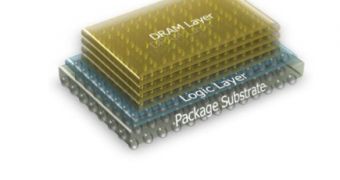Unhappy with the transfer rates offered by the DDR3 technology, Micron has started to develop a new type of memory that promises to deliver 20 times more performance than the chips used in today's computers.
This new technology is called "Hybrid Memory Cube" and promises to tap in into the full performance offered by DRAM, getting past the so-called “memory wall.”
“Where DRAM is positioned in the system, you really get into some intractable performance bottlenecks,” said Brian M. Shirley, vice president of DRAM Solutions at Micron, in a phone interview with Cnet.
“As you move to new memory technologies, the computer is not able to take advantage of that extra performance.
“This is true for not just Micron but for everyone (all memory chip makers). It's something called the 'memory wall,'" he continued.
This bottleneck is caused by the limited transfer capacity of the data channel that sits between the memory and the controller, in the case of today's computers DDR3, which can't support the high speeds the DRAM chips are able of functioning at.
“We've rearchitected in a way to get through this memory wall and deliver a staggering amount of DRAM bandwidth directly to the processor,” said Shirley.
“20X. Those are real numbers. A credible, defendable number. And there's room to grow on top of that.”
This impressive performance boost is achieved by adding a memory controller to the DRAM chips thus leading to the creation of a higher speed bus which will go directly from the said controller to the CPU.
According to Micron, the first iteration of Hybrid Memory Cube is supposed to make its way into corporate solutions as early as 2012, with significant volumes in 2013. In the consumer space, the technology should arrive sometime in 2015 or 2016.
Meanwhile, Micron will continue to work on developing next-generation DDR4 memory chips.

 14 DAY TRIAL //
14 DAY TRIAL //